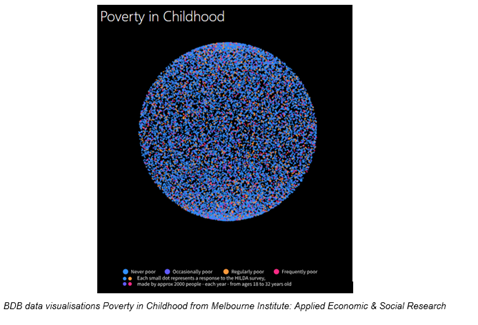
This year, Social Ventures Australia conducted research with young people in the western suburbs of Sydney and Melbourne to uncover why they struggled to make the transition from school to work. From poor experiences with employers who cancelled shifts or underpaid them, to ‘misleading’ entry-level opportunities where employers expect work experience, the pathways into the workforce are difficult for young people who have left school early.
Australia faces a pressing challenge – breaking the cycles of disadvantage that have long-lasting effects on its youth. But we have new tools to help us. This project is combining insights from youth voice and big data to lead the way.
Longitudinal data from the Household, Income, and Labour Dynamics in Australia (HILDA) survey illustrates just how significantly childhood poverty impacts life outcomes. Those who experienced poverty for at least 50% of their childhood are less likely to complete high school, face increased health problems, earn less, and experience higher unemployment rates than their more affluent peers (source: BDB data visualizations Poverty in Childhood, unimelb.edu.au).

The need to re-engage more young people in education was reinforced by the Australian Universities Accord Interim Report released in July this year which estimates that 55% of future jobs will require a university degree. According to Education Minister Jason Clare, only 15% of young people from poor families have a university degree. To equip the future labour force with
the necessary skills, universities need to better support students who are disadvantaged by lower socioeconomic and regional backgrounds.
A New Approach: Breaking Down Siloes Via Collaboration and Shared Data
It’s not all bleak though – young people are providing the signposts for the system changes we need. The SVA study points to the hurdles that the gig economy has created for them – they have told us of the corrosive effects of low-quality jobs and no job security. It is now our job to make the case to governments and employers for change. And to do that we need high quality data.
We are witnessing new partnerships that cross university, government, and the not-for-profit sector in moves to combine sector insights with research expertise. And there is a doubling down on those partnerships using powerful linked datasets to develop new and innovative solutions.
With New Challenges, We Need New Approaches
While many organisations across the country have long been working diligently to address the hurdles facing disadvantaged youth, there has been a historical tendency towards siloed research and funding.
Aiming to address these siloed challenges, this year the Data Catalyst Network emerged – comprising over 50 organisations including The Smith Foundation, Mission Australia, Social Ventures Australia, Brave Foundation, Launch Housing, 54 Reason, Youth Project, the University of Melbourne and more. This is an Australian first for such a large cross-sector cohort to be formed to collaborate on new and innovative data projects.
The network spans the country, with focused groups working across Melbourne, Brisbane, and South Australia. In Melbourne, we confronted the following problem statement: that early school leavers are at a greater risk of entering or continuing a cycle of disadvantage. Through a series of working groups, experts worked together, identifying the best ways to arrest the cycle using data, then locating and sharing data to unlock new approaches.
The group was unanimous in calling for stronger inclusion of youth voices in the development of new solutions. But there is not enough focus on youth voices in this area. By reviewing the small youth voice literature, the network identified the following critical challenges:
1. Support systems and mentorships need to stop the drift
Young people who had few support systems lacked direction and this led to disengaging with education, training, and the workforce.
Young people need mentors to help them master job skills, like crafting job applications, writing effective resumes, and learning interview techniques. According to a Youth Actions Survey (2022), many young people worried that they had not developed these foundational career journey skills. (Interestingly Generative AI tools like ChatGPT can support young people with these skills, but disadvantaged young people are less likely to be able to access those tools.)
The report also found that people who were connected to youth and employment programs were more likely to be put on the right pathway for the future. Programs that were able to understand the complexity of their lived experience and offer tailored, individualised support resulted in better outcomes. This is particularly evident for youth experiencing multiple health and other challenges including mental health issues, disengagement from unsupported education, and involvement with the justice system.
2. Bad workforce experiences result in disengagement
Young people talked about the value of supportive co-workers and managers, helping them settle into their roles and make more progress at work. Combined research on young people’s experiences found that they often felt let down by the quality of support and treatment they received from employers.
Unfair pay, reduced or cancelled shifts, and unsafe workplaces are major sources of distress and disengagement from work for young people starting out at work. First Nations youth, those with disabilities, or from culturally diverse backgrounds often struggled to stay on track if they lacked supportive employers who understand their needs.
Vocational education and training (VET) is proven to be a positive pathway for disadvantaged youth, but current completion rates are subpar, emphasizing the need for stronger regulation and support mechanisms for employers who are engaging apprentices. A robust foundation in VET is essential for future employment prospects.
3. There is poor support for the rapidly changing future of work
Some young people are dissatisfied with traditional career education pathways. According to research from The Longitudinal Study of Australian Children on career aspirations, young people are enticed by what researchers call “fantasy” occupations such as “games developer”, “blogger” or sports-related roles such as “professional AFL player”. These roles only represent a small percentage of actual jobs in the labour market.
Yet traditional careers like ‘doctor’, or ‘lawyer’ are also frequently aspired to. However, there are many new jobs that are non-traditional – roles such as “Communications Professional” or “Project Manager” have low awareness and without this transparency or education around new jobs, fields and pathways, young people can lose faith in the advice they are given.
According to the 2022 Australian Youth Barometer Report, only half of young people aged 18-24 felt that their education adequately prepared them for the future, leaving them feeling overwhelmed at selecting pathways.
Informal mechanisms, like the guidance of family, friends, employers and educators were not much better, and these support systems also lack access to up-to-date data on availability of prospects in the labour market.
So where to from here?
Our approach to tackling youth disadvantage is built on cross-sector collaboration, listening to young people, and using big data to make evidence-based arguments and adapt programs. We need to better understand which jobs offer people a good start through reasonable wages and duration of employment.
Young people have told us that poor-quality jobs leave them feeling disrespected and unable to support themselves financially. Youth employment services need better data to help find those better work opportunities.
These results will help young people see which jobs give them the best start, they will help lobby employers to create decent working conditions. And they will help lobby governments to deliver the structural changes that support disadvantaged youth.
About Kristen: Dr. Kristen Moeller-Saxone is the data capability lead of the Data Catalyst Network, a data impact network of more than 50 organisations on a mission to improve the not-for-profit sector’s data capability.
About Infoxchange: Infoxchange is a not-for-profit technology social enterprise providing support, software, client management and digital capability training for more than 35,000 not-for-profits and community services nation-wide. Infoxchange connects Australia’s leading not-for-profits organisations in collaborative projects merging government, academia and charity representatives to reduce siloed research and generate shared outcomes and actions. Infoxchange also runs Ask Izzy, Australia’s largest social services and emergency hardship assistance directory connecting vulnerable Australians with food, housing, mental health, legal support and more.


